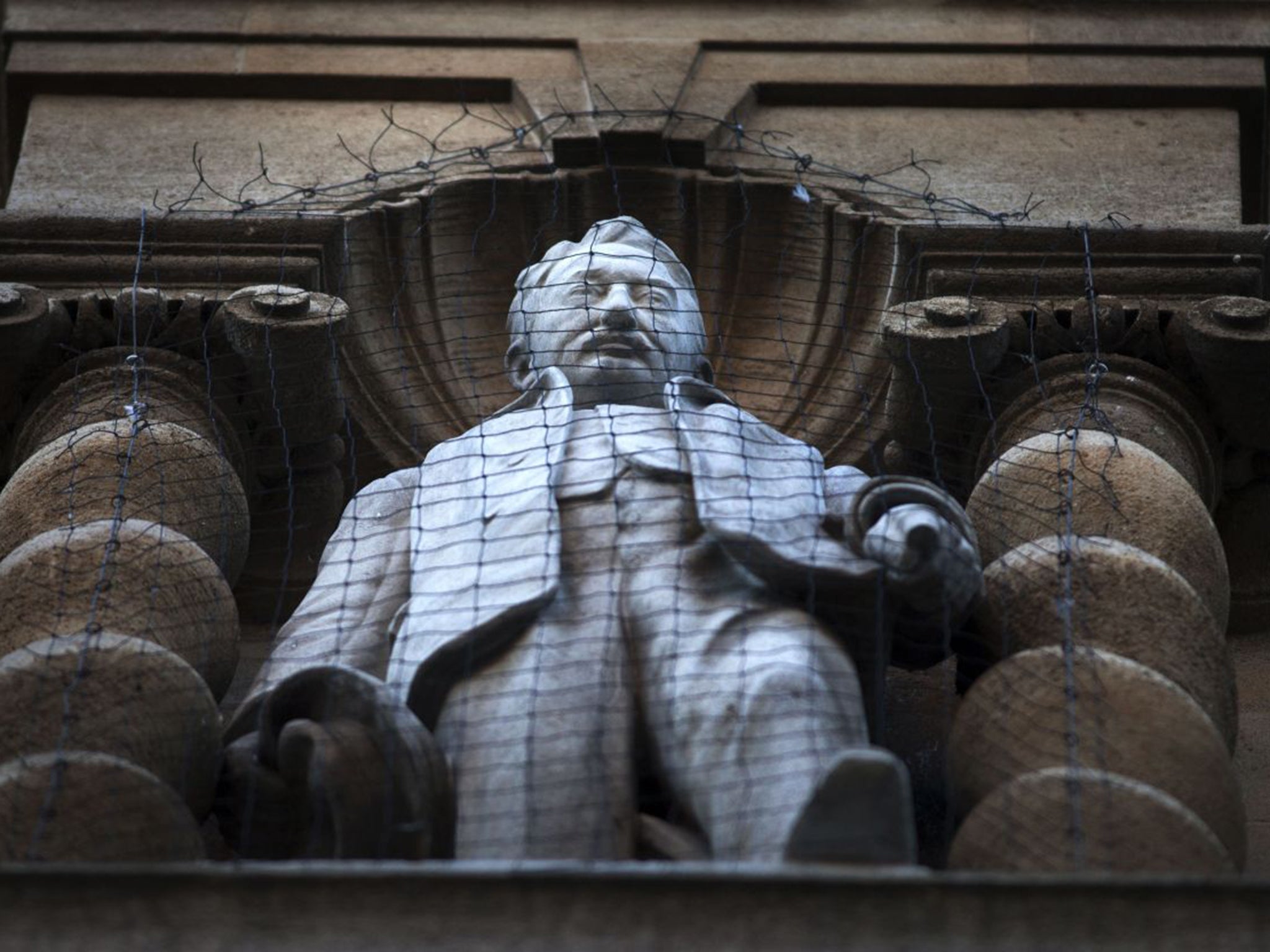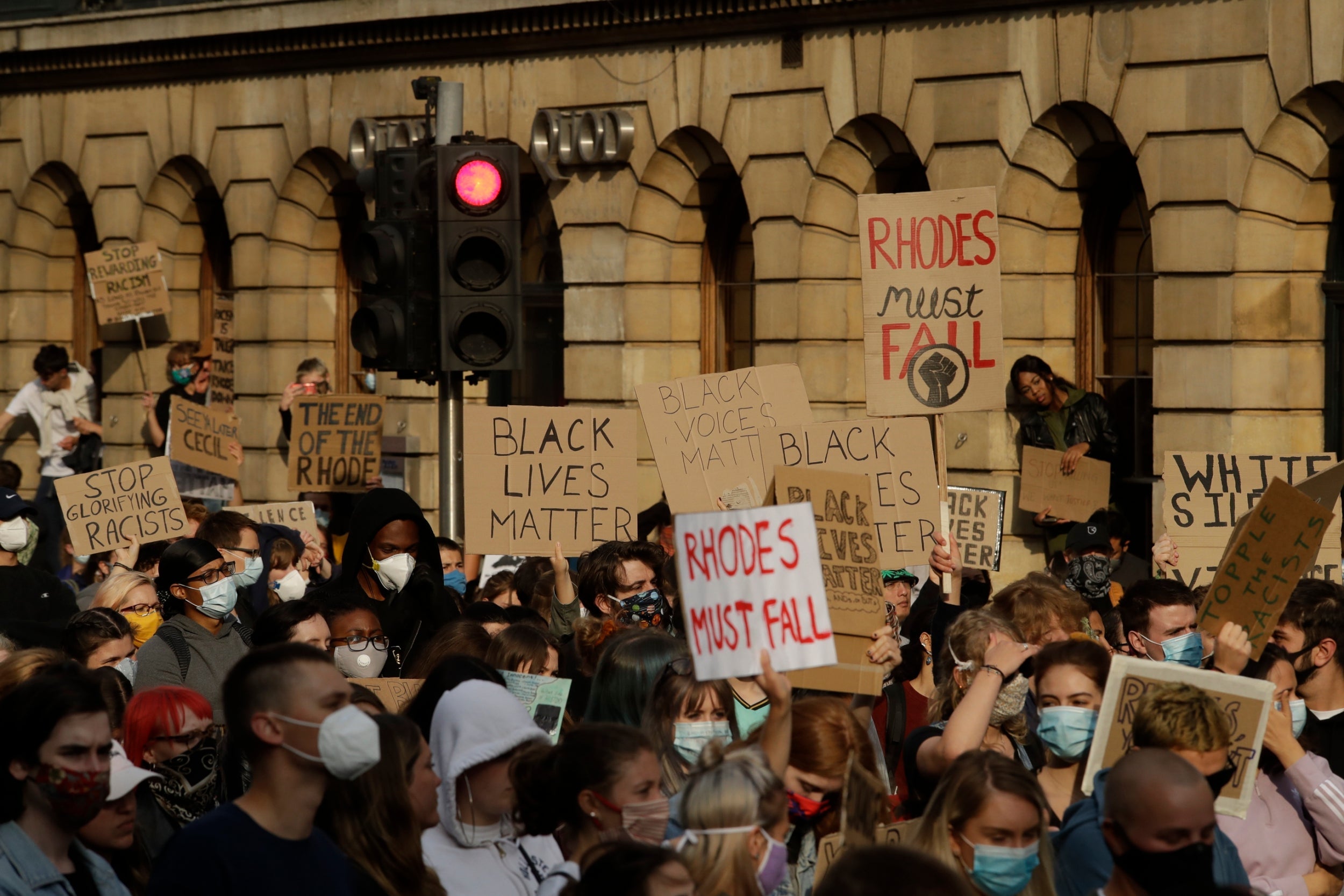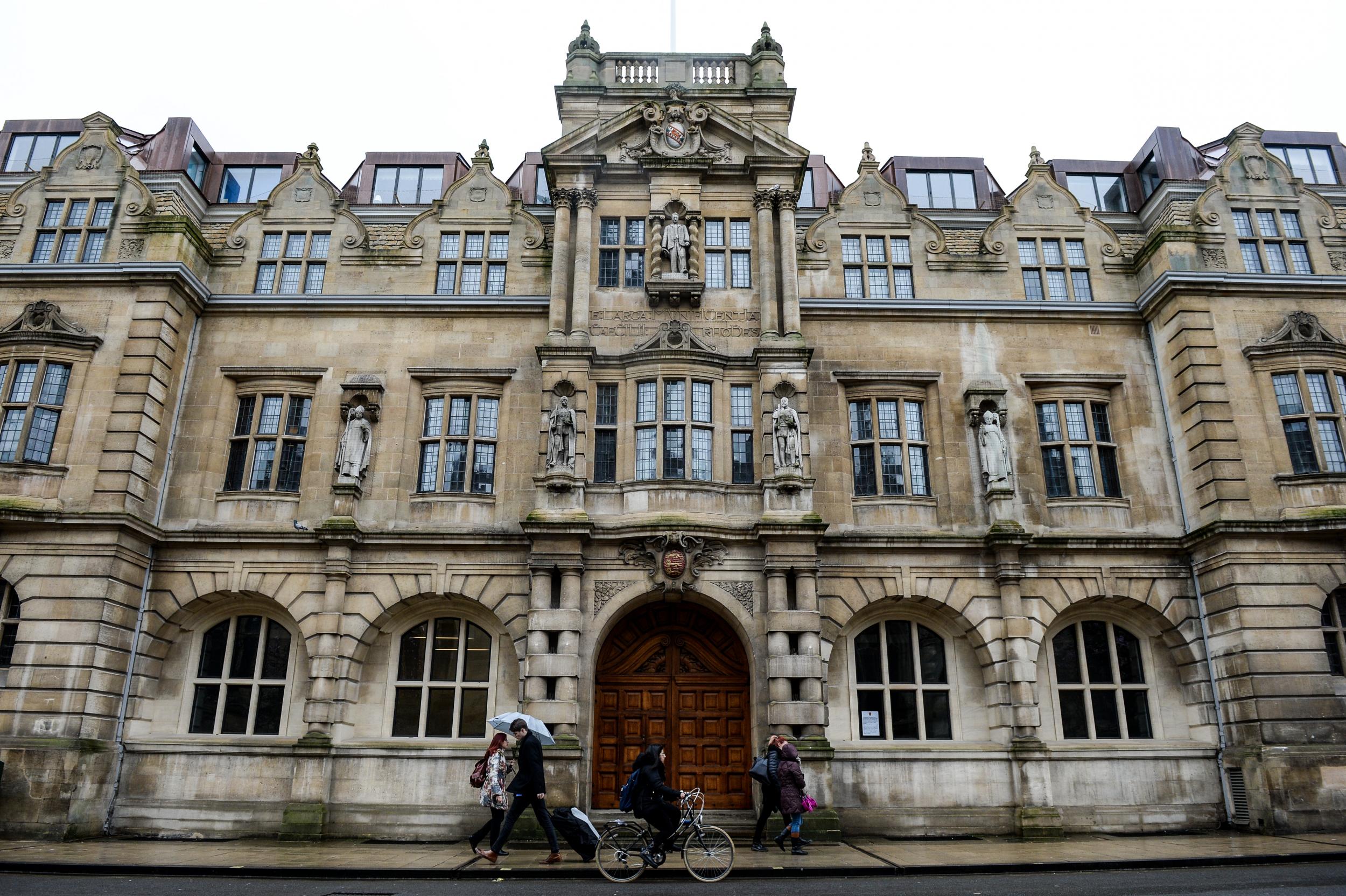Cecil Rhodes: How Black Lives Matter and Bristolian vandalism renewed hope that Oxford’s imperialist benefactor could fall
While Rhodes was never going to fall as Colston did, campaigners to remove the statue believe public opinion has turned in their favour - Vincent Wood reports.


Your support helps us to tell the story
From reproductive rights to climate change to Big Tech, The Independent is on the ground when the story is developing. Whether it's investigating the financials of Elon Musk's pro-Trump PAC or producing our latest documentary, 'The A Word', which shines a light on the American women fighting for reproductive rights, we know how important it is to parse out the facts from the messaging.
At such a critical moment in US history, we need reporters on the ground. Your donation allows us to keep sending journalists to speak to both sides of the story.
The Independent is trusted by Americans across the entire political spectrum. And unlike many other quality news outlets, we choose not to lock Americans out of our reporting and analysis with paywalls. We believe quality journalism should be available to everyone, paid for by those who can afford it.
Your support makes all the difference.When it was built more than 100 years ago, the statue of Cecil Rhodes that looms on the face of Oriel College was designed to look down on people as they entered the building he had paid for. With his hat in hand and his foot perched just over the ledge of a plinth bearing his name, the imperialist and diamond magnate donated the equivalent of £7.8m for the privilege to stare onto Oxford's high street as the gatekeeper to one of the most prestigious learning establishments in the world.
However, on Tuesday, Rhodes’ stone eyes were trained not on those rushing to class or towards the city centre - but on a coalition of more than a thousand students, lecturers and local residents decrying his colonialist and white supremacist views.
The protest, one of a string of anti-racism rallies to have spread across the nation and the world in recent weeks, carried many of the hallmarks of those that have taken place since the death of black American George Floyd in Minneapolis at the hands of a police officer. The crowd sat and fell silent for 8 minutes and 46 seconds - the time it took for Floyd to die in police custody with an officer’s knee on his neck. Protestors screamed that black lives mattered, and demanded justice for those who died at the hands of law enforcement. While framed by the international movement, one chant in particular anchored it in the local - Rhodes must fall.
“There has been a reigniting of the conversation of veneration of atrocious characters in world history”, protest organiser Ndjodi Ndeunyema told The Independent. “It’s allowed us to reinvigorate that conversation that we started in 2015 here in Oxford University”.
It has been more than five years since students first began to demand Oriel College reckon with the past of its imperialist benefactor. While part of a wider movement to decolonise academia by including more black and minority ethnic (Bame) voices in course literature and address prejudice faced by students - the removal of the statue became a flash point in a national conversation on how Britain’s modern day multicultural understanding of itself settled with its colonial past.

The campaign had begun more than 9,700km away in Cape Town, where the city’s namesake university also carried a statue of the imperialist - built in the country where Rhodes had paved the way for apartheid during his time as Cape Colony prime minister, while living out his white supremacist belief that humanity was improved by the spread of the Anglo-Saxon “first race”. That statue came down as a result of student action. But in Oxford, those agitating for their pleas for the founder of the De Beers diamond company to be deposed were met with opposition from both the university and the broader public.
Caught up in a national conversation about university safe spaces, the step towards decolonising one of the world’s most prestigious seats of learning was dismissed as a matter of student politics - and was ultimately met with the decision by college officials to keep the statue and add "a clear historical context to explain why it is there". While university figures said they were seeking to preserve a complex and challenging history, activists accused the establishment of siding with wealthy donors who they alleged had threatened to remove funding.
But that was before a revived Black Lives Matters movement in the US sparked new life into calls for action on systemic racism the world over. In the UK, around 200 protests took place across the weekend despite coronavirus guidelines ruling out gatherings of more than six. In Bristol, the statue of slaver Edward Colston was torn down and thrown into the river Avon. Shortly after images began to circulate of a sign held outside Oriel College - a red-lettered banner reading “Rhodes, you’re next”.
Rhodes was never going to fall as Colston did - not least because the statue is three storeys above the ground, and the rooftop was manned by police officers during Tuesday’s protest. However, with the national conversation focussed not on student politics but on systemic racism, campaigners feel like they have an advantage. “Public opinion has shifted in our favour”, said Mr Ndeunyma, who was among those to have taken part in the initial protest action half a decade prior. “People have expressed a great [level of] objection because we have taken the initiative to expose Rhodes and his genocidal history“
He added: “Of course many a time we've heard arguments of us seeking to obfuscate democratic processes - but we have stressed and continued to stress the use of the democratic processes to express our disgruntlement with the veneration of people such as Cecil Rhodes here at Oxford University. It is upon those institutions to take such matters seriously, not only in reflecting critically upon figures such as Rhodes, but also taking substantive steps to show meaningful solidarity with black lives.”
While potentially cathartic for those in Bristol, the destruction of Colston's statue was not met so warmly in Westminster. The day after the the slaver’s likeness was brought to the ground, home secretary Priti Patel told the House of Commons it was “not for mobs to tear down statues and cause criminal damage in our street” while adding people should go through the “proper channels” to get rid of such monuments. Boris Johnson meanwhile said in a pre-recorded statement he would not “support or indulge those who break the law... or desecrate public monuments”. Even leader of the opposition, Sir Keir Starmer, said the action was “completely wrong” and the statue should have been “brought down properly, with consent”, and placed in a museum.
The statue of Colston had irked locals for years - with some residents saying local politicians had not heard their calls for it to be removed. In Oxford however, councillors have rallied around the new calls for Rhodes to be expunged from the walls of Oriel.

Leader of Oxford City Council Susan Brown, who has called on the university to apply for planning permission to remove the statue, said: “The question of statues and their historical context is not a simple matter, but sometimes acts of symbolism are important.
“I know my views are shared by a majority of my fellow councillors. It would be better for the statue to be placed in a museum, such as the Ashmolean or the Museum of Oxford, to ensure this noteworthy piece of the story of our city isn’t lost to history.
“Of course, bringing down statues alone isn’t sufficient to address the issue of racism in our society and continued action on this should involve all our city’s key institutions.”
But while the argument could be made that Bristolians could have settled their issues at the ballot box by electing those who pledged to remove Colston, the same can not be said for opponents of Rhodes - who can only appeal to the university.
In reference to the home secretary and the prime minister’s calls for democratic resolutions to the problem, Mr Ndeunyema said: “We are not giving up on democracy and we have stood on the side of democracy for the five years of the existence of this movement - but of course those who retain institutional power have the responsibility to ensure that democracy becomes meaningful and is substantive, rather than being used as a rhetorical device to silence those who seek to open up public discourse.”
Despite a nationwide shift towards removing venerations of those who represent the darker side of Britain’s past, the university is yet to make any commitments to addressing its own. A spokesperson for Oriel said the college “ abhors racism and discrimination in all its forms” and its governing body “are deeply committed to equality within our community at Oriel, the University of Oxford and the wider world”.
“We believe Black Lives Matter and support the right to peaceful protest” the spokesperson added. “As a college, we continue to debate and discuss the issues raised by the presence on our site of examples of contested heritage relating to Cecil Rhodes.”
Meanwhile, a week before the protest, the University of Oxford wrote on Twitter it was “committed to supporting our community in opposing racism in all its forms, including upholding anti-racist values”. Rhodes remained - and remains - the elephant in the room.
Mr Ndeunyema added: “Many of the demands that we'll present at this protest have not been satisfied, they've fallen on deaf ears and ours is to communicate clearly to the university and to the college that yes, you can kick this into the long grass but it won't go away.
“Yes students will move on but students will continue to object to the institutional practices that are symbolised by objectionable iconography such as that of Cecil Rhodes.”
Join our commenting forum
Join thought-provoking conversations, follow other Independent readers and see their replies
Comments